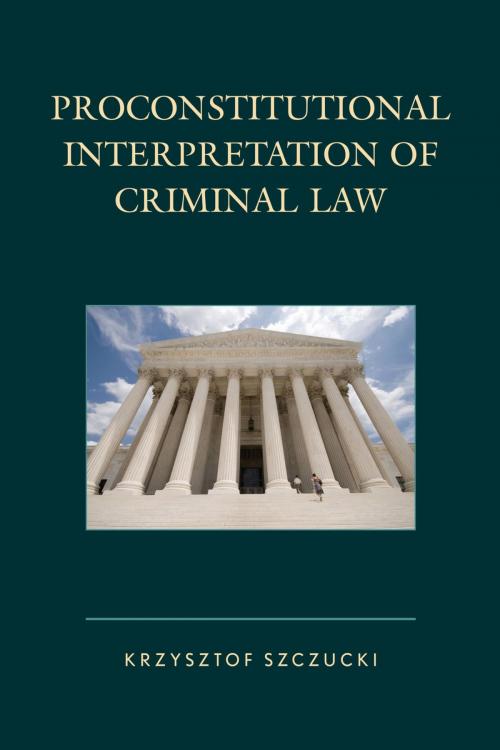Proconstitutional Interpretation of Criminal Law
Nonfiction, Reference & Language, Law, Criminal law, Social & Cultural Studies, Political Science| Author: | Krzysztof Szczucki | ISBN: | 9781498535854 |
| Publisher: | Lexington Books | Publication: | December 1, 2016 |
| Imprint: | Lexington Books | Language: | English |
| Author: | Krzysztof Szczucki |
| ISBN: | 9781498535854 |
| Publisher: | Lexington Books |
| Publication: | December 1, 2016 |
| Imprint: | Lexington Books |
| Language: | English |
Underlying the research for the purposes of this book were one basic assumption: transposing legal articles to behavioral norms, suitable in given circumstances and capable of resolving a problem, in this case from the realm of criminal law is difficult. This difficulty pertains not only to citizens, who cannot avail themselves of professional tools of interpretation of legal texts, but also to practitioners and academics, arguing over the correct construction of a regulation. It may be that criminal law – all its convoluted structure, overloaded with dogmatic principles – will never be understandable for average citizens. Nonetheless, it seems to be worthwhile to seek a platform for understanding, and a model for reacting to a dynamically changing social reality with its core and less fluid values. The method of finding moral clarity in criminal law is the proconstitutional interpretation. The perception of a constitution, an observation which concerns mainly democratic states, as a source of information about values of fundamental and integrating importance to a policy, led to a method of reconciling criminal law with those values within the constitution. Approaching a constitution as a source of information about values, as a matrix within which there exists a catalog of the most important values, without the need to reach beyond the system of positive law, makes this supposition acceptable also for those practitioners and academics who prefer a systemically imminent approach. The proposed scheme allows authorities responsible for forming and enforcing the law to take into account those values that play a significant role in social life. At the same time, it continues to embrace principles of legal reasoning, a safeguard against going into considerations reaching beyond the legal system. Not only may the method espoused in the book become applicable and, at least to some extent, adopted in Poland, but in other constitutional democracies as well.
Underlying the research for the purposes of this book were one basic assumption: transposing legal articles to behavioral norms, suitable in given circumstances and capable of resolving a problem, in this case from the realm of criminal law is difficult. This difficulty pertains not only to citizens, who cannot avail themselves of professional tools of interpretation of legal texts, but also to practitioners and academics, arguing over the correct construction of a regulation. It may be that criminal law – all its convoluted structure, overloaded with dogmatic principles – will never be understandable for average citizens. Nonetheless, it seems to be worthwhile to seek a platform for understanding, and a model for reacting to a dynamically changing social reality with its core and less fluid values. The method of finding moral clarity in criminal law is the proconstitutional interpretation. The perception of a constitution, an observation which concerns mainly democratic states, as a source of information about values of fundamental and integrating importance to a policy, led to a method of reconciling criminal law with those values within the constitution. Approaching a constitution as a source of information about values, as a matrix within which there exists a catalog of the most important values, without the need to reach beyond the system of positive law, makes this supposition acceptable also for those practitioners and academics who prefer a systemically imminent approach. The proposed scheme allows authorities responsible for forming and enforcing the law to take into account those values that play a significant role in social life. At the same time, it continues to embrace principles of legal reasoning, a safeguard against going into considerations reaching beyond the legal system. Not only may the method espoused in the book become applicable and, at least to some extent, adopted in Poland, but in other constitutional democracies as well.















